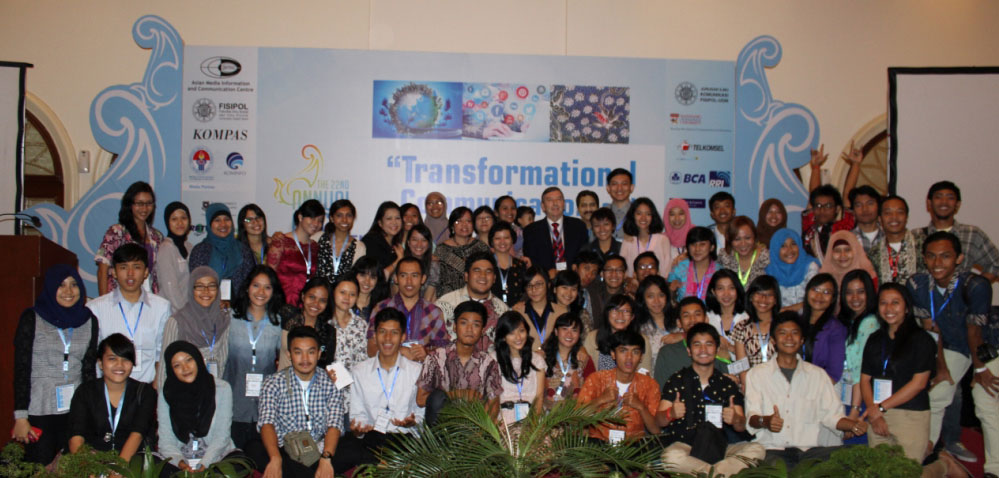
Sep 12, 2013 | Member Updates, News
Safe journey and until we meet again!
That was the farewell message to delegates from AMIC 22nd international conference hosts Universitas Gadjah Mada (UGM) at the conference closing in Yogyakarta, Indonesia on 7th July.
After four days of intense and intellectually stimulating discourse on a diverse variety of communication subjects and issues in both plenary and parallel sessions, the conference concluded with a final plenary on New Media, Old Media Ethics, followed by a grand closing ceremony.
Dean of the Faculty of Social and Political Sciences at UGM, Dr. Erwan Agus Purwanto, represented the UGM Rector, Dr. Pratikno, at the concluding event and thanked all delegates for participating in the conference.
AMIC Chairman, Professor Ang Peng Hwa of Singapore expressed AMIC’s profuse thanks to the hosts and called on delegates to gather again next year for AMIC’s 23rd international conference. The location and venue have yet to be named.
 AMIC’s Secretary-General, Assoc. Prof. Martin Hadlow, especially thanked UGM’s conference committee leader, Dr. Phil. Hermin Indah Wahyuni of UGM, and her team of staff and students.
AMIC’s Secretary-General, Assoc. Prof. Martin Hadlow, especially thanked UGM’s conference committee leader, Dr. Phil. Hermin Indah Wahyuni of UGM, and her team of staff and students.
The ceremony concluded with gifts being presented to the Dean and to Dr. Hermin.
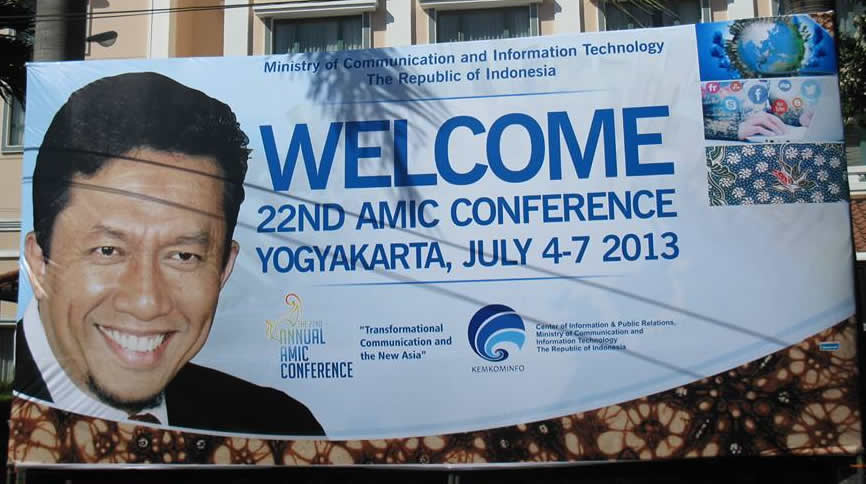
Sep 12, 2013 | News
Indonesians are some of the most dynamic Internet users in the world.
 That was the message from Dr. Freddy H. Tulong, Director-General for Information and Public Communication of the Ministry of Communication and Information Technology, speaking at the opening session of AMIC’s 22nd international conference in Yogyakarta.
That was the message from Dr. Freddy H. Tulong, Director-General for Information and Public Communication of the Ministry of Communication and Information Technology, speaking at the opening session of AMIC’s 22nd international conference in Yogyakarta.
Of Indonesia’s population of 250 million people, some 63 million are using the Internet, with 95% of them having social media accounts, such as Facebook and Twitter.
Dr. Tulung told the audience that Indonesians are the fourth largest group of Facebook users in the world, after the USA, Brazil and India. More than 29 million Indonesians also have Twitter accounts, making them the fifth biggest global Twitter community, after the USA, Brazil, Japan and the UK. There are now more than 280 million cell phones in use in Indonesia, of which 63% are ‘smart phones’.
 Dr. Tulung was speaking on behalf of the Minister of Communications and Information Technology, Mr. Tifatul Sembiring.
Dr. Tulung was speaking on behalf of the Minister of Communications and Information Technology, Mr. Tifatul Sembiring.
The second keynote was given by Mr. Roy Suryo Notodiprodjo, Minister of Youth and Sports. The Minister outlined the way in which Indonesia’s huge population of young people was actively involved in new technologies and how these tools were changing society.

An opening address of welcome at the inaugural session was given by the Rector of Universitas Gadjah Mada, Dr. Pratikno. UGM is the host organisation for AMIC’s annual conference. The Chair of AMIC’s Board, Professor Ang Peng Hwa, and Secretary-General, Associate Professor Martin Hadlow also spoke.
The conference, which has attracted paper presenters from 24 countries, runs from 4th-7th July.
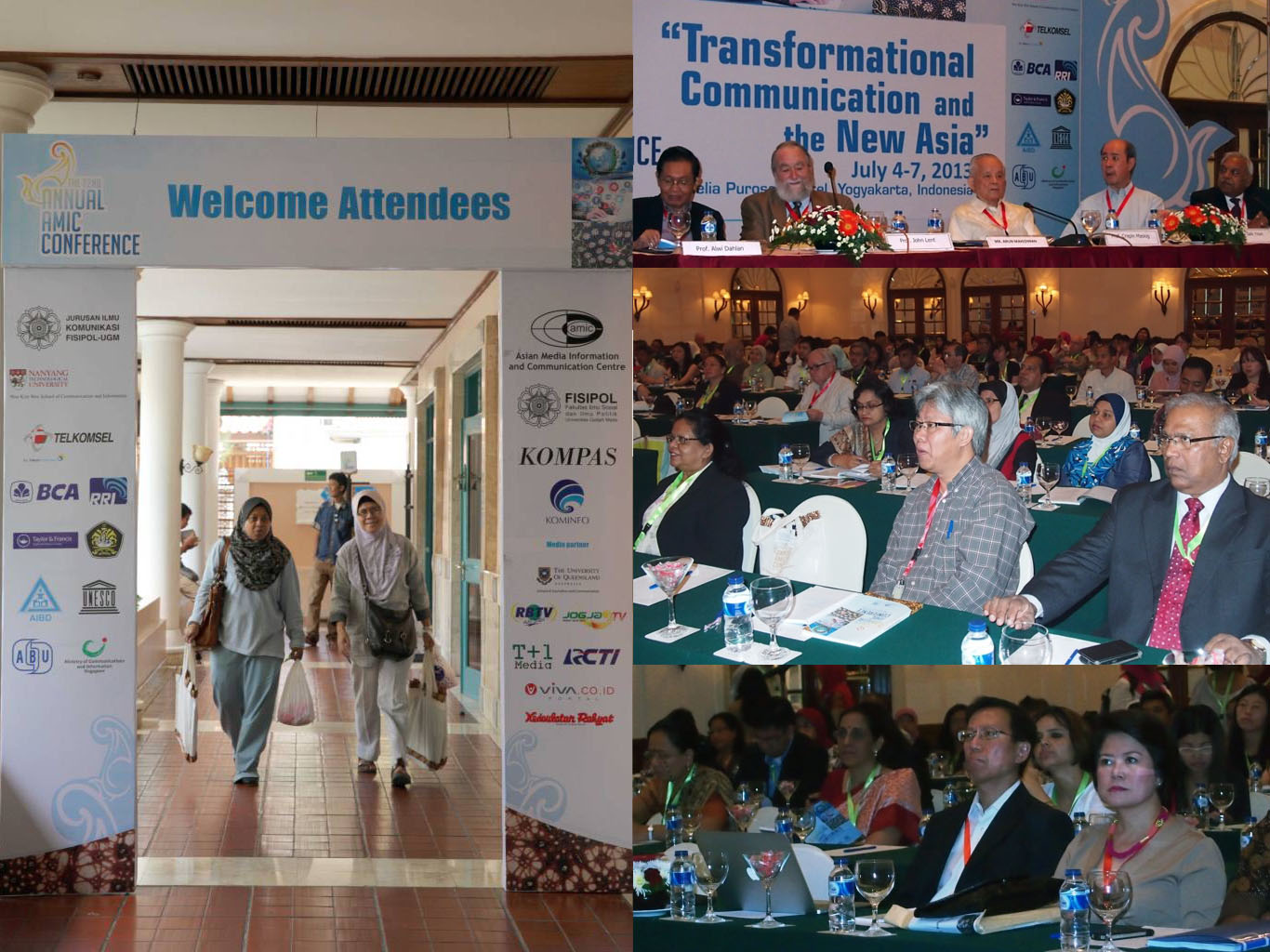
Sep 12, 2013 | News
“Much room remains for the future of development communication in Asia” is the view of Professor John Lent, speaker in the UNESCO Emeritus Dialogue at AMIC’s 2013 international conference.
 A veteran specialist in the field of Asian development communication, Professor Lent, of Temple University, USA, said that poverty in Asia had not dropped as much as had been hoped and that most of the world’s chronically malnourished live in the Asia-Pacific region. He said that small communication projects initiated by communities to address poverty issues at the grassroots level are still important.
A veteran specialist in the field of Asian development communication, Professor Lent, of Temple University, USA, said that poverty in Asia had not dropped as much as had been hoped and that most of the world’s chronically malnourished live in the Asia-Pacific region. He said that small communication projects initiated by communities to address poverty issues at the grassroots level are still important.
The UNESCO Emeritus Dialogue was held as the first plenary session at the AMIC 2013 conference in Yogyakarta, Indonesia (4th-7th July). The topic for discussion was Development Communication and the New Asia: still a role?
Another speaker, Chin Saik Yoon, Southbound Press publisher from Malaysia, asked about the role of development communication 50 years hence. “What will be the ‘new poverty’ for Asia in 2052?” he asked.
According to Mr. Chin, the main future issues relate to climate change and sustainable development. He talked of consumption patterns and contended that “we may have to admit our messages in the past were wrong.” Given the long-term implications of climate change, Mr. Chin said that “solutions may take two or three generations to complete”. In the future, there will be no more “personal gain” messages he believes. He offered the view that messages will have to play on altruism and that people will have to accept that “you do this so your great-grandchildren will still have water to drink.”
Long-term Philippines development communication expert, Professor Crispin Maslog, reinforced the view that “development communication still has a place in the world while there is poverty”. Similar views were held by other UNESCO Emeritus Dialogue speakers, Professor Alwi Dahlan from Indonesia, and Professor Binod Agrawal from India.
In a world of new technologies where poverty is still widespread, “we have to recapture our humanity” Professor John Lent reminded the audience.
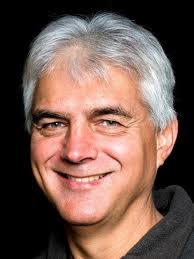
Sep 12, 2013 | Annual Conference, News
 In a video presentation for the UNESCO Emeritus Dialogue session on development communication, UNESCO’s global Director for Freedom of Expression and Media Development, Guy Berger, has said that AMIC is “one of the most esteemed research partners of UNESCO”.
In a video presentation for the UNESCO Emeritus Dialogue session on development communication, UNESCO’s global Director for Freedom of Expression and Media Development, Guy Berger, has said that AMIC is “one of the most esteemed research partners of UNESCO”.
He talked of “new paradigms in development communication” and said that “since the early behaviourists’ concepts and practices of ‘devcom’, there has been dynamic and, indeed, pluralistic development of paradigms in this field.” Dr. Berger said that “these reflect the changing contexts nationally, internationally and technologically”.
The AMIC conference UNESCO Emeritus Dialogue brought together five international experts to look at whether development communication still has a place in the ‘New Asia’.

Jul 15, 2013 | News
 AUSTRALIA AUSTRALIA
Assoc. Prof. Martin Hadlow
Adjunct Associate Professor, School of Communication and Arts University of Queensland
Australia
Email: m.hadlow@uq.edu.au
 BHUTAN BHUTAN
Mr. Dawa Penjor
Executive Director
Bhutan Media Foundation
P.O.Box. 1655
Thimphu
BHUTAN
Phone: +975-2-331716
E-mail: ed@bmf.bt
 CAMBODIA CAMBODIA
Mr. Sovannara Chan
Project Coordinator
Cambodia Communication Institute
Royal University of Phnom Penh
Phone: +855 12 770 891
Skype: chansovannara
Facebook: www.facebook.com/naragraphy
Email: csvannara@gmail.com
 INDIA INDIA
Dr. Pradeep Krishnatrey
Mudra Institute of Communications – MICA Ahmedabad
Email: cbpattanayak@gmail.com
Prof. Chandrabhanu Pattanayak
Centurion University of Technology and Management
Khurda, Odisha, India
Email: cbpattanayak@gmail.com
Dr. Mira Desai
Associate Professor
University Department of Extension Education
S.N.D.T. University Mumbai
Juhu Campus, Santacruz (West)
Mumbai 400049
INDIA
Email:drmiradesai@gmail.com, sndtmedia@hotmail.com
 INDONESIA INDONESIA
Dr. Phil. Hermin Indah Wahyuni, M.Si.
Lecturer
Communication Department
Faculty of Social and Political Sciences
Universitas Gadjah Mada
Jl. Sosio Yusticia, No.2, Bulaksumur
Yogyakarta. 55281
INDONESIA
Email : hermin_iw@ugm.ac.id
herminkilo12@gmail.com
Tel.: (+62) 81-7261770
 JAPAN JAPAN
Dr Muneo Kaigo
Associate Professor
University of Tsukuba
Faculty of Humanities and Social Sciences
1-1-1 Tennodai Tsukuba
Ibaraki 305-8571
JAPAN
Email : mkaigo@japan.tsukuba.ac.jp
 KAZAKHSTAN KAZAKHSTAN
Dr. Saule Barleybaeva
Faculty of Journalism
Kazakh National University (KazNU)
Almathy
KAZAKHSTAN
E-mail: tv.headmaster@gmail.com
 LAO PEOPLE’S DEMOCRATIC REPUBLIC LAO PEOPLE’S DEMOCRATIC REPUBLIC
Ms. Hommala Phensisanavong
Head of Newspaper Academic Unit
Senior Lecturer, Lao Language-Mass Communication Department
Faculty of Letters
National University of Laos
Dongdok Campus Xaythany District, Vientiane, Lao PDR, P O Box: 7322
LAO PEOPLE’S DEMOCRATIC REPUBLIC
Phone: (856-21) 770 308
Mobile: (856-20) 5611 2849;
Fax: (856-21) 770 381
Email : hommala39@hotmail.com
|
 MYANMAR MYANMAR
U Ko Ko
Chairman, Yangon Media Group, Ltd.
President, Myanmar Journalists Association
MYANMAR
Email : kksmtkt@gmail.com
 NEW ZEALAND NEW ZEALAND
Dr. David Robie
Professor
Director, Pacific Media Centre
School of Communication Studies
AUT University, Private Bag 92006
Auckland
NEW ZEALAND
Tel: (649+) 921 9999 x:7834
Email : david.robie@aut.ac.nz
Website: www.pmc.aut.ac.nz
 PAKISTAN PAKISTAN
<imgsrc=”images/stories/flag/flag-papuanewguinea.gif” border=”0″ alt=”Papua New Guinea” width=”25″ height=”25″ align=”absmiddle” /> PAPUA NEW GUINEA
Mr. Patrick Matbob
Communication and Arts Department
Divine Word University
PAPUA NEW GUINEA
Email: pmatbob@dwu.ac.pg
patrick.matbob@gmail.com
Mobile Number: (+675) 7331-6708
Fr. Rey JoSev Hechanova Caigoy, OCarm.
Diocesan Pastoral Vicar
Archdiocese of Port Moresby
PAPUA NEW GUINEA
Email : rey.caigoy@yahoo.com
 PHILIPPINES PHILIPPINES
Dr. Ma. Margarita Acosta
Department of Communication
Miriam College
Quezon City
Email: macosta@mc.edu.ph
Office Landline: (+63-2) 580-5400,
loc. 2120/2022/2127
Dr. Rosario M. Baseleres
Director, Instructional Media
and Technology Center
Silliman University, Dumaguete City
Visayas
PHILIPPINES
Email: rose4basel@gmail.com
rosariombaseleres@su.edu.ph
Office Landline: (+63-35) 422-6002,
local 255 (Secretary to the Dean);
local 256 (Dean’s Office)
Dr. Ma. Theresa M. Rivera
Associate Professor
Far Eastern University
Manila, PHILIPPINES
Email: riveramtm2@gmail.com
Tel: (+63-88) 858-3116, local 3100/3107
 SRI LANKA SRI LANKA
Mr. Asoka Dias
Director, Broadcasting Stations,
MTV Channel Pvt Ltd,
No. 36,Araliya Uyana, Depanama,
Pannipitiya, Sri Lanka
Office Landline: (+94) 11-2840270
Mobile: (+94) 777 302109
Email: mpasokadias@gmail.com;
asokadias@sirasatv.maharaja.lk
 THAILAND THAILAND
Dr. Kamolrat Intaratat
Director & Founder, The Research
Center of Communication
and Development Knowledge
Management (CCDKM), Sukhothai
Thammathirat Open University,
Nonthaburi, 11120, Thailand
Chair of Communication Arts
for ASEAN International Program
(Master Degree Program)
Line ID : kamolratccdkm
Phone : (66) 86 5299551
Skype : kamolrat.intaratat
Twitter : @kamolrat10
E-mail : kamolratchim@gmail.com,
kamolrat.int@stou.ac.th
Website : www.CCDKM.org;
For Master Degree Program:
asean-commarts.stou.ac.th
 UNITED ARAB EMIRATES (U.A.E.) UNITED ARAB EMIRATES (U.A.E.)
Dr. Bradley Freeman
Associate Professor of Communication
and Information Studies
American University in Dubai
Address: P.O. Box 28282, Dubai , U.A.E.
Direct line: (+9714) 318 3429;
Landline: (+9714) 399- 9000
Ext. 429; (+9714) 399-8899
Email : bfreeman@aud.edu
Website: www.aud.edu
 UNITED KINGDOM UNITED KINGDOM
Dr Venkat Iyer
Senior Lecturer in Law, Ulster University
Office Address: School of Law,
Ulster University, Newtownabbey,
Co Antrim, BT37 0QB, UK
Email Address: venkat_iyer_@hotmail.com:
Mobile Number:(+44) 7811-062951 |
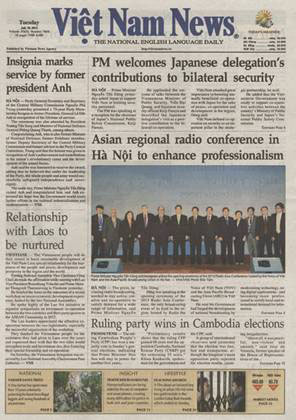
Jul 12, 2013 | News
 The Prime Minister of Vietnam has called on radio broadcasters to be more dynamic, creative and co-operative to meet the increasing demands of society.
The Prime Minister of Vietnam has called on radio broadcasters to be more dynamic, creative and co-operative to meet the increasing demands of society.
Mr. Nguyen Tan Dung was speaking at the opening ceremony of the RadioAsia 2013 conference in Hanoi. The conference theme was Radio and Social Media: Where to Next?
“Digital technology and the booming social media have given the public greater access to diverse sources of information” he said. The Prime Minister noted that this is “gradually changing the media context in each nation and the world over”.
In his opening address, the President of Radio the Voice of Vietnam (VOV), Mr. Nguyen Dang Tien, said that VOV “has adopted the current trend and made good use of opportunities offered by social networks to diversify its programming”. He reminded delegates that VOV is the only national media organization in Vietnam with four media platforms- radio, television, print and on-line.
Also speaking at the opening ceremony, AMIC’s Secretary-General, Assoc. Prof. Martin Hadlow, said that radio still had a vital role in society. “The messages it carries are understood by all, even those who cannot read or write” he said, “and radio brings life-long educational opportunities, life-saving information, culture and entertainment to individuals no matter where they are, or what they are doing”.
The Secretary-General of the Asia-Pacific Broadcasting Union (ABU), Dr. Javad Mottaghi, told delegates that radio in a digital age “is going through a watershed change, with digital radio providing many possibilities for new content applications, data based services, graphics and still pictures”.
Digital technologies and the impact of social media on radio broadcasting were key issues discussed at RadioAsia, the region’s premier conference dedicated to the medium. The three day event, which brought together several hundred delegates and speakers, was hosted by Radio the Voice of Vietnam and co-organised by AMIC, the ABU and VOV.

 AMIC’s Secretary-General, Assoc. Prof. Martin Hadlow, especially thanked UGM’s conference committee leader, Dr. Phil. Hermin Indah Wahyuni of UGM, and her team of staff and students.
AMIC’s Secretary-General, Assoc. Prof. Martin Hadlow, especially thanked UGM’s conference committee leader, Dr. Phil. Hermin Indah Wahyuni of UGM, and her team of staff and students.

 Dr. Tulung was speaking on behalf of the Minister of Communications and Information Technology, Mr. Tifatul Sembiring.
Dr. Tulung was speaking on behalf of the Minister of Communications and Information Technology, Mr. Tifatul Sembiring.

 A veteran specialist in the field of Asian development communication, Professor Lent, of Temple University, USA, said that poverty in Asia had not dropped as much as had been hoped and that most of the world’s chronically malnourished live in the Asia-Pacific region. He said that small communication projects initiated by communities to address poverty issues at the grassroots level are still important.
A veteran specialist in the field of Asian development communication, Professor Lent, of Temple University, USA, said that poverty in Asia had not dropped as much as had been hoped and that most of the world’s chronically malnourished live in the Asia-Pacific region. He said that small communication projects initiated by communities to address poverty issues at the grassroots level are still important.
 In a video presentation for the UNESCO Emeritus Dialogue session on development communication, UNESCO’s global Director for Freedom of Expression and Media Development, Guy Berger, has said that AMIC is “one of the most esteemed research partners of UNESCO”.
In a video presentation for the UNESCO Emeritus Dialogue session on development communication, UNESCO’s global Director for Freedom of Expression and Media Development, Guy Berger, has said that AMIC is “one of the most esteemed research partners of UNESCO”.
 PAKISTAN
PAKISTAN 
 The Prime Minister of Vietnam has called on radio broadcasters to be more dynamic, creative and co-operative to meet the increasing demands of society.
The Prime Minister of Vietnam has called on radio broadcasters to be more dynamic, creative and co-operative to meet the increasing demands of society.